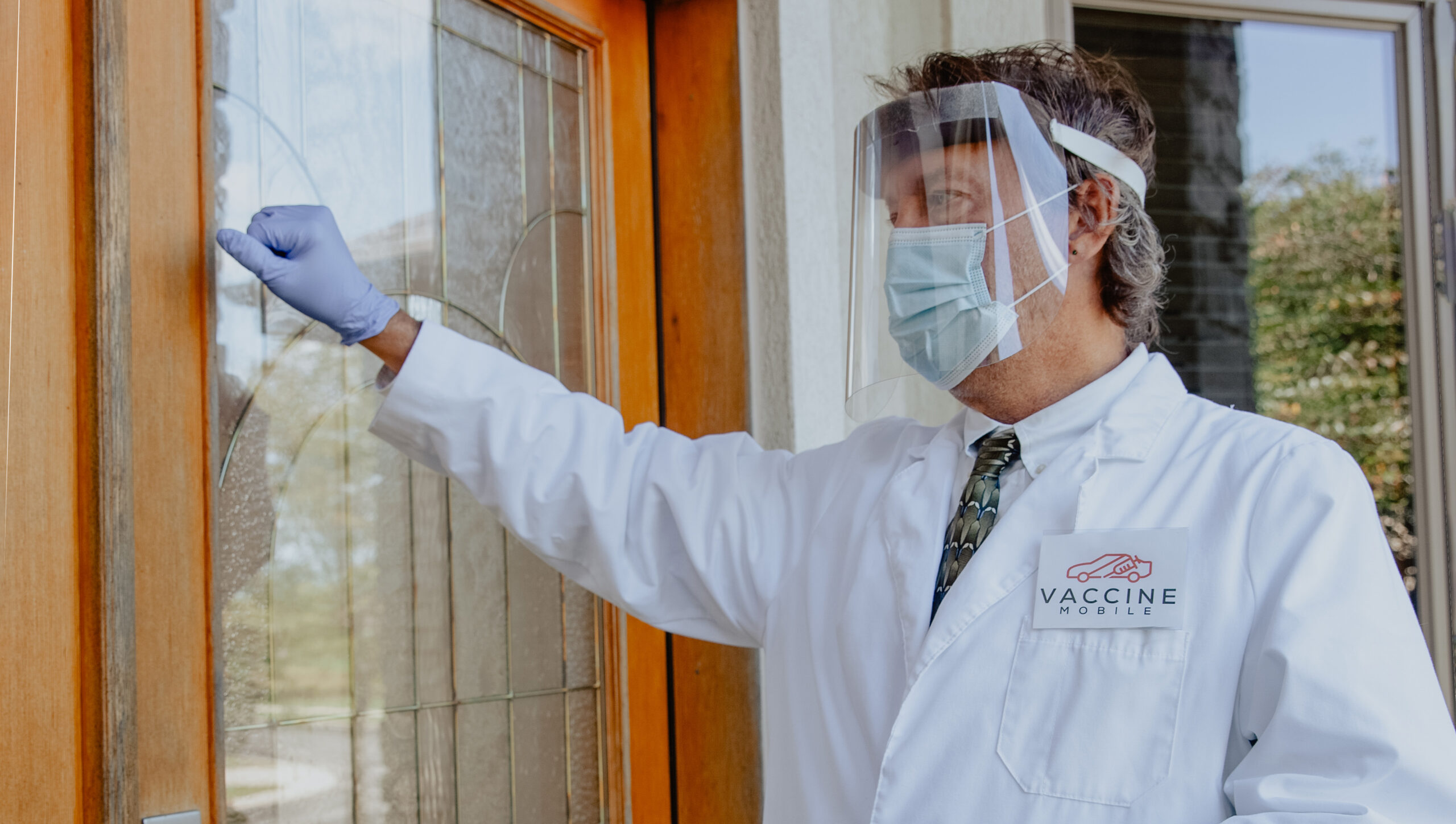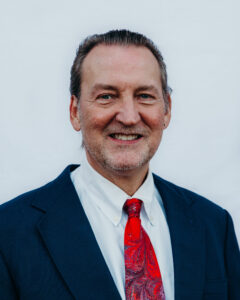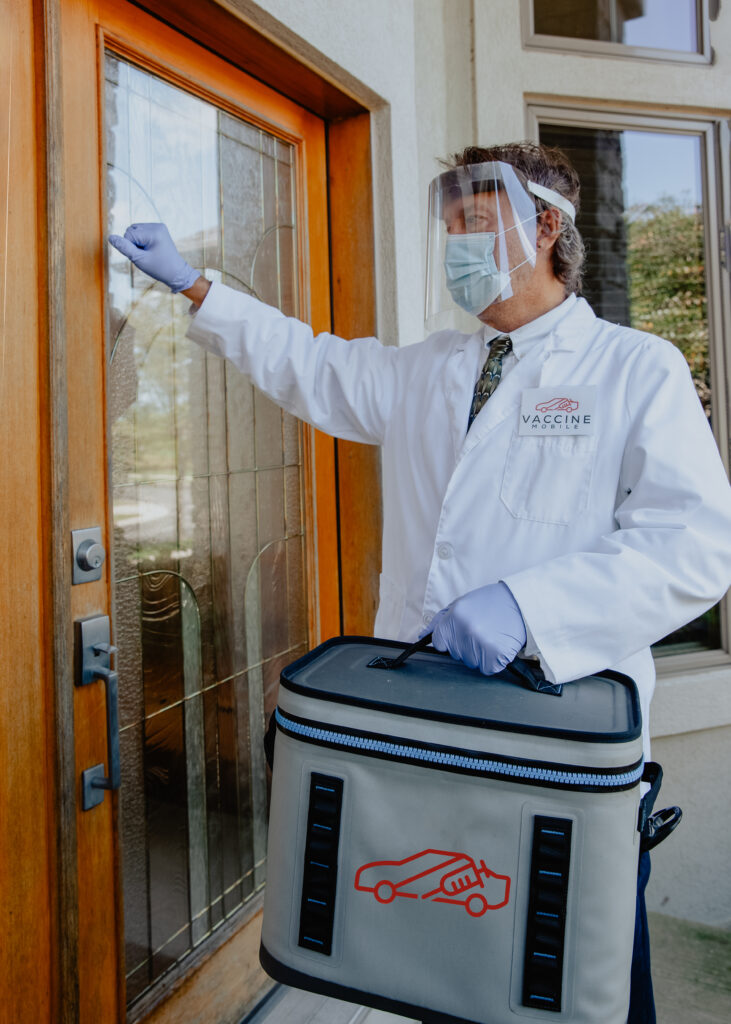
School of Pharmacy alumnus vaccinates mobility-challenged populations through new startup
By Mary Magnuson
For Wisconsin-based pharmacist and University of Wisconsin–Madison School of Pharmacy alumnus Lance Moran (BS ’88, MS ’91), his career has always been about serving disadvantaged patients.
A serial entrepreneur, Moran launched his latest venture this summer in Madison, Wis. Through his new program, called Vaccine Mobile, Moran vaccinates community members under Medicare who are in assisted living facilities or in their own homes, when leaving can be difficult or dangerous. As the COVID-19 pandemic has swept Wisconsin, Moran’s new business is poised to be even more essential.
“Access and mobility are the major hurdles for a lot of people in the population that I’m serving, and these people are so thankful,” Moran says. “It’s been very rewarding. It might be the most feel-good thing I’ve ever done in my life.”
The launch
Moran had the idea for Vaccine Mobile while brainstorming ideas to increase vaccine accessibility.
“In January, I thought it would be nice to have some way for people to be able to receive vaccinations outside of the normal scope of pharmacy,” Moran says. After some research, Moran determined that targeting the Medicare population would be the best place to start, considering those patients’ needs and the mechanisms of reimbursement Medicare has for pharmacists.
Moran set up a website for potential customers in the Dane County area to reserve their spot and select which vaccine(s) they’d like to receive. Then, Moran or his business partner will drive over and administer the injections, dressed in full personal protective equipment.
“It’s been very rewarding. It might be the most feel-good thing I’ve ever done in my life.”
—Lance Moran
Currently, Vaccine Mobile is offering influenza and pneumococcal vaccines, which is what Moran can distribute under Medicare. Because of restrictions in service reimbursements for pharmacists, he can only bill through Medicare, or through cash in some circumstances, which limits his customer base, but he’s working to change that. He’s begun to enter contracts with third-party payers and insurers through the Medicare Advantage plan, such as Humana, Cigna, and United, as well as Madison-area insurers Unity and Dean Health Plan.
Moran says he’s gone as far as Janesville to provide a flu vaccination, and he’s willing to expand his radius farther as his number of clients increases. One day, he says he hopes to implement Vaccine Mobile franchises across the state, or even the country.
In the six weeks that Vaccine Mobile has been up and running, Moran says he’s vaccinated over 100 people for the flu. And when the COVID-19 vaccine comes out, likely sometime in 2021, Moran says he already has his certification to administer that vaccine through Medicare as well.
“For people who typically have more difficulty getting out and about, people with complex diseases like multiple sclerosis or cerebral palsy and are in their homes, bedridden with caregivers 24/7, this service is essential,” Moran says.
Traversing speed bumps
The biggest challenge in launching the business, Moran says, came from pharmacists’ exclusion from provider status. To get the necessary registration and licensing to administer vaccines, Moran had to register his business as a pharmacy clinic, like you might see in Target or Walgreens, instead of registering as an individual pharmacist.

Moran believes pharmacists should be recognized under provider status because they are trained for and provide the same kinds of services as physicians, such as immunization administration, in more accessible locations. Instead of making an appointment to visit a health clinic and see a physician, patients can simply walk into a pharmacy — or request a visit from Vaccine Mobile — to get the same service.
“I can bill as a pharmacy to give a flu shot, but I can’t bill as a pharmacist to give a flu shot, which is really unfortunate. The profession just isn’t recognized like a nurse provider would be for doing the same exact service,” Moran says. “And this has been a long-standing issue with pharmacists trying to become recognized as providers nationally.”
As Moran navigated that obstacle, pharmaceutical wholesalers introduced another hurdle: delivery. Moran didn’t have an office, and pharmaceutical companies can’t ship orders to residential addresses. Luckily, a colleague offered space for Moran to store and receive the vaccines.
There was just one task left: Moran had to pay for and learn a whole new software, specifically designed for billing through Medicare.
“I could do it on paper but that just seemed so old school, and it would take at least 30 days to get paid,” Moran says. With that out of the way, he was ready to get Vaccine Mobile rolling.
Entrepreneurial state of mind
Moran has had a variety of different startups in the past, including a beauty salon, real estate development project, and an aviation business, and he assisted in the launch of a brewery, construction company, and a restaurant. This background in a variety of industries provided him with the business experience necessary to get this running quickly. His last business, called Health Pro Staffing, matched pharmacists and technicians with hospitals and clinics — like a temp agency for the healthcare field.
Moran and his team made the decision to close Health Pro Staffing in 2014 after about 19 years of operation. At its peak, it operated in five states, and Moran says it was his largest business venture — at least so far.

Much of what he learned at the School of Pharmacy set him up for entrepreneurial success, he says. The biggest takeaway that continues to motivate him in his career is the Wisconsin Idea.
“It just gets in your head that you just want to do good things in the world, and that’s what I wanted to do,” Moran says.
Moving forward, Moran says he wants to make Vaccine Mobile a franchise, where interested practitioners across the country could sign up to drive around and disseminate vaccines, either as a side gig or a full-time job. Moran says having gone through the difficult, complicated process of setting up the business himself means he is now prepared to make it easier for other pharmacists hoping to reach their community members on a different level.
“I feel like I know enough to teach others to do this, where it could be a franchise,” Moran says. “I think in the longer term we’re going to form a new corporation and then begin selling franchises.”
Moran also says he hopes to find a way for student pharmacists in the state to experience a service like Vaccine Mobile, potentially through an elective Advanced Pharmacy Practice Experience rotation focused on entrepreneurship and nontraditional careers.
“I don’t think there are any courses like this anywhere at other pharmacy schools. It could be a first,” Moran says, who has long been a preceptor for the School of Pharmacy.
“I enjoy teaching, and it could be a real-world opportunity for a pharmacy student to participate — perhaps a student may have an idea for a new pharmacy business to carry the torch of the Wisconsin Idea into the next generation.”